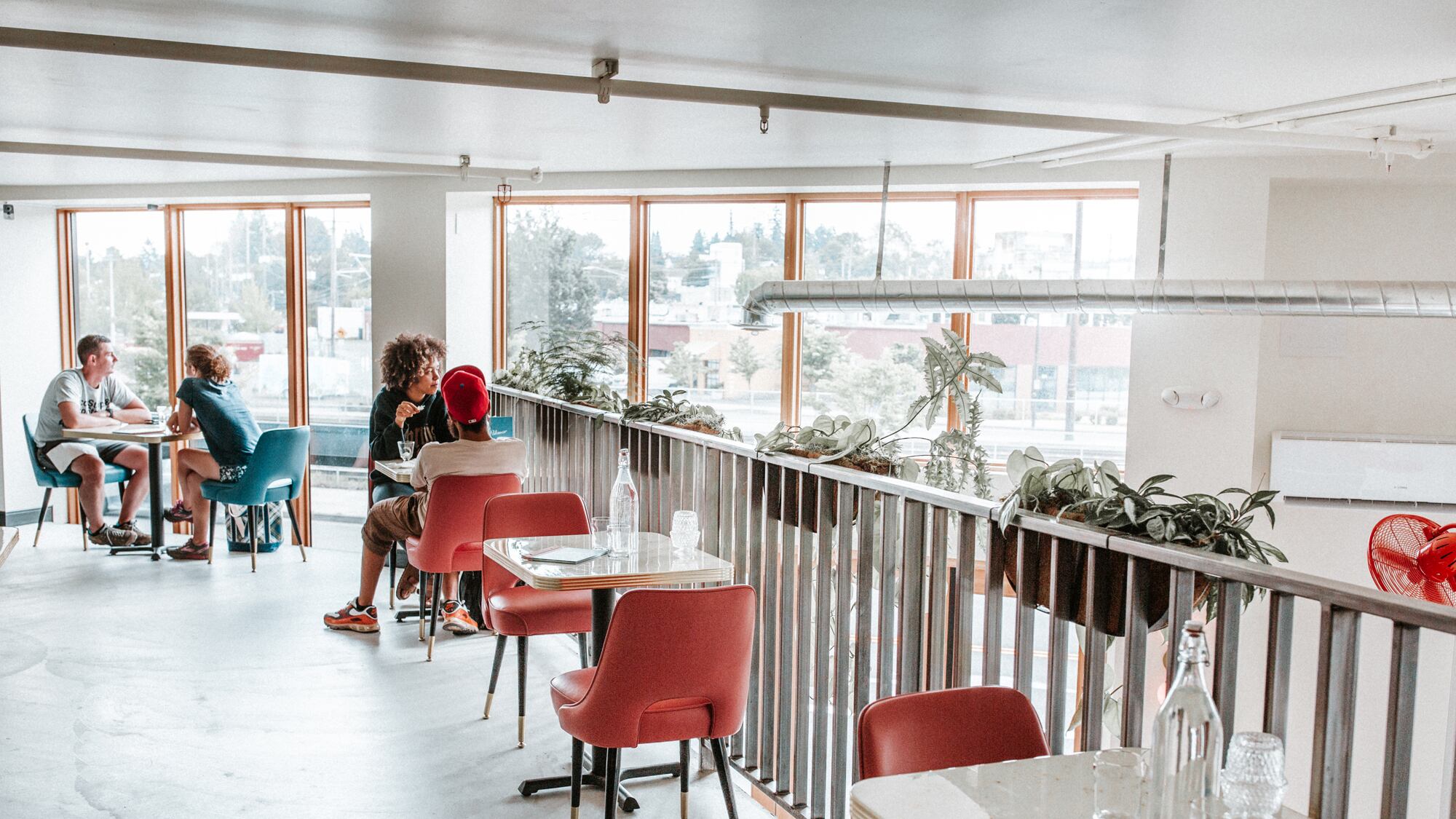My first visit to Palomar caught me off guard.
When it opened in April, in the new building on Southeast Division Street with a 70-foot geisha painted on the side, the daiquiri-focused bar and restaurant was said to be inspired both by owner Ricky Gomez's Cuban heritage and his hometown of New Orleans.

Going in, I thought that meant I was visiting a New Orleans-themed Portland bar.
I walked across Palomar's angular, floral-patterned tile floor to my barstool, a plump, ochre yellow leather seat with matte black and bronze accents—the most beautiful barstool in Portland. A hardbound menu, rich with illustrations of islands and sunsets and cocktails and bikini-clad women sitting on the backs of flamingos, colored in muted pink and teal, waited for me atop white marble. From the list, I ordered a Daiquiri No. 3 ($10), a sweetened variation on the Hemingway Daiquiri.

To my surprise, that's exactly what I was served.
It was not made with aged rum, nor set off with an obscure vermouth. It was the sum of its citrusy parts—a daiquiri.
Turns out, Palomar is more like a New Orleans bar that just happens to be in Portland.

In Portland, the goal of a cocktail bar is often to placate the capricious whims of the city's booze dweebs with deep-cut aged spirits, weird liqueurs and specialty bitters—haikus written by mustachioed 29-year-olds in short-sleeved button-ups.
Meanwhile, many of New Orleans' elite restaurants strive for something much simpler—to create the best possible interpretations of Louisiana's long list of distinct cuisines and drinks.
That's precisely what you get at Palomar.

Perhaps that shouldn't have been so surprising, given that Gomez's local pedigree includes two years at eminent Pearl District cocktail spot Teardrop Lounge and eight months tending bar at James Beard Award-winning steakhouse Ox, which he helped open. In 2012, he was crowned best bartender in the United States in a competition held by Diageo.
On Palomar's cocktail list, you will find classic cocktails with simple twists. The pineapple gin and tonic ($11), made with Beefeater Gin house-infused with pineapple, tasted how it was supposed to—like a gin and tonic infused with pineapple. Similarly, the piña colada ($12) tasted like a piña colada.

The frozen daiquiri ($9) is among the best in Portland. It is an ode to the Bourbon Street spots that serve dozens of gummy bear-flavored booze slushies in enormous plastic foam cups, a rich blast of mango with a velvet-smooth texture. The Sting Wray ($9) tastes, in the well-meaning words of my dining companion, "like a bunch of fucked-up rum and Squirt." The Cobbler ($11) is a master class in balance, a mix of dark rum, sherry, guava, lemon, orange and bitters in which each ingredient amplifies the off-dry sherry notes to channel everything you want in a tiki drink, minus the sweetness.

With 30 cocktails divided into three sections with a handful of add-ons—you can add a spritz of absinthe to any cocktail for 25 cents, which is recommended for all the daiquiris—the menu is borderline overwhelming. There are some individual missteps. Palomar's take on the Alexander ($11), made with gin and bananas foster ice cream from Coolhaus, tasted like melted ice cream, and not in a good way. Four daiquiris can be ordered shaken or blended, and the blended varieties, diluted by ice, were noticeably flatter than their shaken counterparts.

But Palomar is almost as much a restaurant as it is bar, with two pages of sandwiches, salads and plates from former Interurban sous chef Patrick Kille, whom Gomez took to Miami to research the city's Cuban diner cuisine.
The Frita Cubana ($9) is the killer of the bunch, a messy, beef and pork chorizo burger covered in fried potato matchsticks, American cheese and onions that channels Carl's Jr. straight into the elite tier of Portland burgers, The Medianoche ($10) is a humbler option—a take on the Cubano that balances savory pork, ham, pickles and mustard with a sweet, pillowy brioche specially baked for Palomar by Fleur De Lis Bakery and grilled flat.

Our order of baked oysters ($14)—a half-dozen topped with breadcrumbs and served with thick slices of garlic bread—were unfortunately stricken by gigantism. The size and texture of the fleshy part of the hand, each rubbery bite revealed an unappetizing, teaspoon-sized green blob of…something in the middle.
For now, skip the sea monsters—Gomez tells me they're reformulating the recipe—for the Lechon Asado ($13) plate. A tray of tender chunks of pork slow cooked in mojo and grilled to a crispy sheen, it's served with an extraordinary mojo sauce sharp with garlic, orange, lemon and lime juices, white rice and two of six simple vegetable sides.

Palomar's beauty is in its refusal to overthink anything. Portland didn't need another bar that specializes in unpronounceable vermouths and celery bitters. What it needed was a bar with a gin and tonic that also tastes like pineapple, and a daiquiri that tastes like a daiquiri. With Palomar, that's now what it has.
GO: Palomar, 959 SE Division St., 971-266-8276, barpalomar.com. 4 pm-2 am nightly. Minors welcome until 9 pm.
